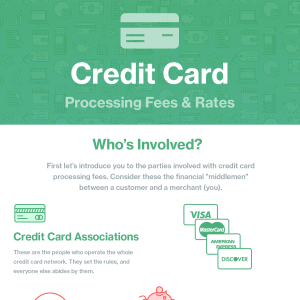Payment processors help your small business accept credit card transactions, but how to do they work? Find out in this guide.
Our content reflects the editorial opinions of our experts. While our site makes money through
referral partnerships, we only partner with companies that meet our standards for quality, as outlined in our independent
rating and scoring system.
Payment processing, or credit card processing, is the process of moving money from a customer’s bank account to a business’s bank account. Simply put, it’s how your business gets paid when customers don’t use physical cash.
While authorizing a payment at your business’s point-of-sale system takes only a matter of seconds, the funding and settlement phase — the time it takes for the money to reach your business’s bank account — is a 2-3 day process with a lot going on behind the scenes.
How Does Credit Card Processing Work?
The credit card transaction process can be summed up in three stages, though multiple steps happen in each stage. Those three stages include authorization, authentication, and settlement:
Authorization
- Payment is initiated via customer. Your customer pays via one of your business’s accepted payment methods.
- Payment information is validated for approval. Depending on the payment method, information like the card number, security code, expiry date, cardholder name, and more is received by a payment gateway or credit card terminal and sent to the payment processor.
Authentication
- Payment processor verifies the card’s security. This step in the payment process is to ensure that the transaction taking place isn’t fraudulent.
- Payment processor communicates authorized transactions. The payment processor communicates information about the approved transaction to the credit card network, e.g., Visa or AMEX.
Settlement
- Funds are debited from the customer’s account. Once the transaction has been approved and validated, it moves into the settlement and funding phase, where money is debited from the issuing bank (i.e., the customer’s account).
- Your business bank account is funded. The debited funds are transferred to the acquiring bank (i.e., your merchant account) and then transferred to your business bank account.
Is There A Difference Between Credit Card Processing And Payment Processing?
“Credit card processing” is often used interchangeably with “payment processing.” In addition to credit cards, credit card processors also allow businesses to accept payments via digital wallets, cryptocurrency, and other payment forms. However, most alternative payment methods still use a credit card network.
Payment Processing Terminology
Here are some important terms to know when it comes to payment processing. These are all different entities that may come into play during a credit card processing transaction. Note that each of these entities may charge a fee for their part in the process.
Payment Processor
A payment processor, or credit card processor, is a general term used to refer to any company that facilitates electronic payments by acting as the messenger between banks and merchants. The payment processor’s main job is to authenticate payment information at the merchant’s point of sale and then later disburse the funds to the merchant after a sale is complete.
Payment processors earn money by charging a fee for processing payments, regardless of the transaction’s outcome.
In the US, some of the most popular payment processors used to accept credit card payments (and ones that we recommend at Merchant Maverick) include Helcim, Clover, and Square.
Payment Gateway
A payment gateway is a software-based service that allows merchants to process transactions over the internet, without physical access to the customer’s payment card or a credit card terminal. These cloud-based payment gateways are necessary for eCommerce, but not for in-person credit card transactions.
However, many brick-and-mortar stores use payment gateways such as Stripe, Square, and Shopify Payments as their primary payment processor. Other businesses may use a traditional credit card processor for in-person transactions and a payment gateway to accept online sales.
Point Of Sale
A point of sale, also known as a POS, includes the hardware and/or software you use to facilitate payment processing. When accepting payments, your POS is where the transaction starts, whether it’s a customer walking up to the cash register or checking out online.
Usually, POS hardware includes (at the very least), a credit card terminal and a tablet screen.
Some POS companies also provide in-house payment processing services.
Merchant Services Provider
A merchant services provider is any company that combines payment processing and merchant account services. These services may include processing equipment, software, and other services that facilitate payment processing, such as a virtual terminal where merchants can manually key in card information into an online portal.
Merchant services providers can be further broken down into two categories: merchant account providers (MAPs) and payment service providers (PSPs).
Whether you need a full-service merchant account or a PSP will depend on the size and nature of your business. Merchants processing only a few thousand dollars per month can usually save money by signing up with a PSP, while larger businesses will require a full-service merchant account due to lower processing costs and increased account security.
Merchant Account Providers
Many businesses use a traditional full-service merchant account as their payment processor. A merchant account comes with a unique identification number that identifies the business to all parties involved in processing a transaction.
Merchant accounts are very stable but can be quite expensive for a small business. In addition to paying processing rates for each transaction, maintaining a merchant account also usually requires the payment of a variety of merchant account fees. However, large, high-volume businesses may be able to negotiate lower credit card fees.
To process eCheck or ACH payments, you’ll need a merchant services provider. This function usually requires a separate service as part of your account, but processing costs are very low.
Examples include Dharma Merchant Services and Helcim.
Payment Service Providers
Payment service providers offer aggregated accounts where every merchant using the service shares the same merchant account. You won’t have a unique merchant account ID number when using a payment service provider, so accounts aren’t as stable as a true merchant account. However, overall costs are significantly lower for a small or newly established business.
Examples include Square, PayPal, and Stripe Payments.
Common Payment Methods Accepted At Small Businesses
When choosing a payment processor for your business, we believe it’s essential to carefully consider which payment methods you want to accept for your business. Depending on the payment methods you choose to accept, you’ll have different costs and hardware requirements.
Here’s how various payment methods will impact your payment processing fees and hardware needs.
Credit Card Processing
While banks issue most credit cards, they’re also sponsored by a small number of credit card associations, such as Visa, Mastercard, Discover, and American Express. These entities charge a variety of fees whenever a purchase is made with one of their cards. These credit card processing fees are collectively known as interchange.
When a transaction is processed, the processor will charge you both interchange and markup in exchange for its processing service. Unfortunately, interchange rates vary widely based on the type of card used and other factors. This has made it easier for processors to rake in higher profits by offering merchants “simplified” processing rate plans (such as flat-rate or tiered pricing).
For this reason, we recommend merchant accounts that offer interchange-plus pricing for most low-risk, established businesses. The interchange-plus pricing method adds a fixed markup to each sale, regardless of the transaction type.
For example: interchange + 0.30% + $0.15 per transaction. While the interchange fee will vary widely with each transaction, the markup that you pay to your processor will always be the same.
Debit Card Processing
Debit card transactions are much easier to process, as the issuing bank doesn’t have to decide whether to issue a credit to the consumer to cover the cost of the purchase. As long as there are sufficient funds in the consumer’s bank account, the transaction will usually be approved.
Because there is no need to issue a credit, the overall risk associated with debit card use is significantly lower than it is with credit cards. For this reason, the interchange rates for debit card use are substantially lower as well.
One of the reasons we encourage you to avoid tiered credit card pricing plans is that many of the processors that offer these plans charge the same rates for debit card use as they do for credit cards. This practice can result in you paying significantly more for debit card processing than you should. This is also a shortcoming with flat-rate credit card processing pricing plans offered by providers such as Square. However, the lack of account fees usually associated with these types of processors often outweighs this consideration, especially for small or seasonal businesses.
If you plan to accept debit card transactions and want to ensure that you pay the lowest possible rates, it’s important that you add a PIN pad to your countertop terminal setup. PIN pads allow your customers to authenticate their debit cards using their Personal Identification Number (PIN). This method is much more secure than simply collecting a signature from a customer, and you’ll pay the lowest processing rates available.
Without a PIN pad, your debit card transactions will process as credit cards, and the much higher credit card processing rates will apply.
eChecks & Localized Payment Methods
In the United States, ACH (Automated Clearing House) payments that generate an all-digital payment from the customer’s checking account are very popular, particularly in the eCommerce sector. eChecks are the digital counterparts to paper checks and are typically processed much more quickly than paper checks.
eCheck and ACH payments go through a separate processing method than credit/debit cards. While it’s possible to have an eCheck-only service without the need for a merchant account, this arrangement won’t be practical for most businesses.
Because not all merchants need them, most merchant service providers offer eCheck processing as an optional service and charge a monthly fee for it (usually $20-$30). You’ll also have to pay a small transaction fee for each processed check, but it’s much less than most credit or debit card transactions.
If your business has a lot of overseas customers, you might also need to include localized payment methods that are popular in places outside the US. For example, AliPay and UnionPay are popular payment methods in China. You’ll want to do your research very carefully to find a provider that can support these payment methods, as they often don’t advertise their availability prominently.
Paper Checks
Although it’s becoming less common, some consumers still prefer to pay by check whenever possible. Merchants can accept paper checks without the need for an eCheck processing service, and you’ll receive 100% of the sale price. However, you’ll have to make a trip to the bank to cash the check, and it might be rejected due to insufficient funds. There’s also the possibility of losing a paper check.
If you want to accept paper checks, you’ll also need a check scanner, which scans an electronic copy of the check and submits it to the customer’s bank to confirm the availability of funds. As long as the check won’t bounce, the transaction is approved immediately. Because of the monthly fees associated with most eCheck processing services, we recommend them only to businesses that accept a high volume of paper checks from their customers.
Digital Mobile Wallets
We’re using the term “digital wallet” here to include payment methods that rely on near-field communication (NFC) technology. NFC-based payment methods utilize small, very short-range radios in both the consumer’s payment device (typically a smartphone or smartwatch) and the merchant’s credit card terminal.
Apple Pay and Google Pay are currently the most popular forms of NFC-based payments. US-based issuing banks are now also beginning to roll out credit cards with NFC chips embedded in them, allowing the customer to wave their card over the payment terminal without having to swipe or dip it. The use of this payment method is growing, however, and merchants should consider adding it to meet the increasing demand.
NFC payment methods are ultimately tied to the user’s credit or debit card, and these transactions are processed as regular card transactions without any additional fees or markup. Other forms of digital wallet payments, such as Walmart’s proprietary Walmart Pay, use the smartphone’s camera to accept QR code payments.
Cryptocurrency
While the majority of small businesses do not accept Bitcoin or any other form of digital currency, you might want to consider adding this payment option at some point. Merchant services providers usually go through a third-party processor to offer Bitcoin processing.
Gift Cards
While not a payment method per se, gift cards reward customer loyalty and encourage repeat purchases. Gift cards are quite popular with consumers, and almost all merchant service providers in the industry can set you up with a gift card program as part of your merchant account.
Many POS system providers also offer gift card acceptance for an added monthly fee, e.g., $25/month.
What’s The Best Way For Businesses To Process Payments?
Depending on your processing setup, which forms of payment you accept, and especially your choice of processor, your business will incur different credit card processing fees.
To keep sales flowing smoothly and fees to a minimum, we recommend choosing one of our favorite small business credit card processing companies for your processing needs.











